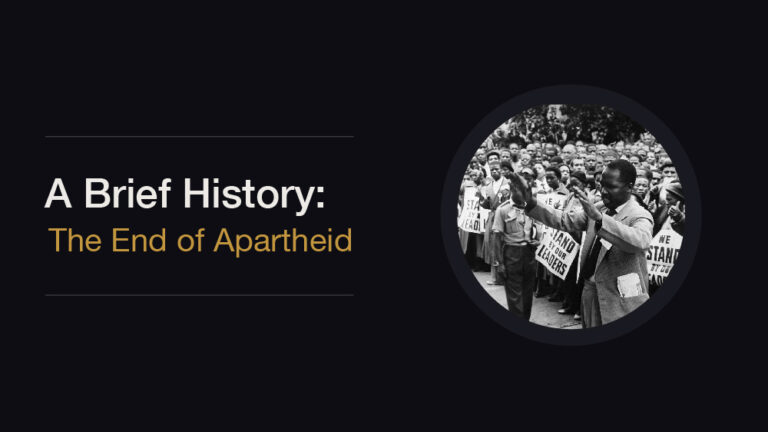Nelson Mandela is one of the most influential figures of the 20th century. He was a leader in the fight against apartheid in South Africa and is remembered as a man who changed the course of history. His life story is one of remarkable courage and determination. Born in 1918, Mandela was the son of a chief in the small village of Mvezo in the Transkei region of South Africa. He was raised in an environment deeply affected by colonial rule and developed a strong sense of justice and a commitment to fighting against oppression.
After attending school, he became actively involved in the African National Congress, or ANC, and was instrumental in the struggle to end apartheid. After many years of imprisonment, Mandela was ultimately released in 1990 and became the first democratically elected president of South Africa in 1994. His legacy continues to inspire people around the world today.
Nelson Mandela: Early life
Nelson Mandela was born in a small village on July 18, 1918, in a part of South Africa that is now part of the Eastern Cape Province. His name was Rolihlahla, meaning “troublemaker” in the Xhosa language. Rolihlahla was later shortened to Nelson by his teacher when he was a child. Mandela’s childhood was shaped by the colonial rule of the British authorities in South Africa. His father served as a minister in the royal court of the Thembu people, one of South Africa’s chiefdoms. His father’s high rank meant that the young Mandela also enjoyed special privileges, including the right to walk about without wearing a tribal mask, normally required for royal court members.
Mandela’s life changed radically at age 13 when his father died. He was then sent to live with an uncle in the Transkei region, where he was expected to become a tribal chief like his father. He was an excellent student and went on to study at the University of South Africa (UNISA) in Johannesburg. After earning his degree, he worked as a law clerk. He became involved in the ANC’s struggle against the racist system of apartheid, which was a system of laws that separated people in South Africa based on their ethnicity, especially black Africans.
Education and involvement in the African National Congress (ANC)
Mandela was a founding member of the ANC Youth League, where he became known for his fierce opposition to the authorities and advocacy for black Africans’ rights. After the ANC was banned, Mandela joined the ANC underground and lived as a fugitive for 20 years, spending much of that time in hiding and moving from place to place to avoid being caught by the police. During this period, Mandela and other ANC leaders organized a campaign of civil disobedience against the apartheid government, publishing newspapers, conducting marches, and organizing strikes, as well as recruiting members and raising funds for the ANC.
In 1956, the government charged Mandela with treason and sentenced him to life in prison. While in prison, he was awarded the Nobel Peace Prize in 1993. He was eventually released in 1990 and went on to play a leading role in the negotiations that ended apartheid and led to the first democratic elections in South Africa in 1994.
Imprisonment and release
Mandela was arrested in 1963 and was initially held in a prison in Pretoria. He was later transferred to Robben Island, a remote prison off the coast of South Africa, where he was held for 18 years in a small cell, forced to do hard labor, and subjected to long periods of isolation. While in prison, he was harassed and subjected to degrading treatment. While on Robben Island, he was forced to live in a small cell where he could not stand straight. His food was passed to him through a small opening in the door, there was no running water, and he was not allowed a toothbrush.
Mandela was also not allowed to communicate with other prisoners and was forced to spend most of his day in complete darkness. This harsh treatment was part of the South African government’s “discipline and silence policy,” which was designed to break the prisoners’ spirits and force them to abandon their political ideals. Despite the hardships of prison life, Mandela and other ANC leaders used the prison to organize political discussions, seminars on political theory, and education programs.
Becoming the first democratically elected president of South Africa
After years of struggle, Mandela emerged from prison in 1990. He traveled the world, meeting foreign leaders, and called for lifting sanctions imposed on South Africa. He also continued to promote the end of apartheid. Mandela’s efforts were rewarded in 1994 when he was elected the first president of a democratic South Africa. He was inaugurated at the Union Buildings in Pretoria, the same building where he had been tried for treason many years before. Mandela remained in office until 1999 when he retired.
He remained active in public life, promoting human rights and encouraging people to work together to build a better future. Along with former US president Jimmy Carter, he founded the Carter-Mandela Joint Health Center. This public health facility diagnoses and treats diseases like HIV/AIDS, tuberculosis, and malaria. Mandela also wrote his autobiography, Long Walk to Freedom, in 1995.
Nelson Mandela: Legacy and influence
During his lifetime, Mandela received many honors and awards, including an honorary knighthood (Order of the British Empire) from the UK and the US Presidential Medal of Freedom. In addition to the Nobel Peace Prize, he was also awarded the Order of Lenin, the Lenin Peace Prize, the International Peace Prize, and the Martin Luther King Award. Mandela also received honorary degrees from numerous universities around the world.
Mandela’s legacy continues to inspire people today, including leaders such as former US president Barack Obama, who described Mandela as “a man who took history in his hands and bent the arc of the moral universe towards justice.” After he died in 2013, the UN Security Council observed a minute of silence in honor of his life and his contribution to peace and democracy.
Nelson Mandela: The Man Who Changed the Course of History
Nelson Mandela was a man who changed the course of history through his advocacy and activism against apartheid in South Africa. Born in a small village in the Eastern Cape province of South Africa, he later became a lawyer, leader of the African National Congress, and the first democratically elected president of South Africa. After spending decades in prison, Mandela emerged in 1990 and traveled the world, advocating for the end of sanctions imposed on South Africa and working to end apartheid. He continued to promote peace and democracy after retirement, remaining influential. Mandela’s legacy continues to inspire people today, including leaders such as former US president Barack Obama, who described Mandela as “a man who took history in his hands and bent the arc of the moral universe towards justice.”
To learn more about how the Mandela family continues to honor Nelson Mandela’s legacy, visit www.houseofmandelatoken.com today!



